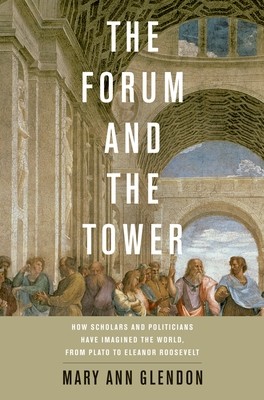
- We will send in 10–14 business days.
- Author: Mary Ann Glendon
- Publisher: Oxford University Press, USA
- ISBN-10: 0199782458
- ISBN-13: 9780199782451
- Format: 16.2 x 24.3 x 2.4 cm, kieti viršeliai
- Language: English
- SAVE -10% with code: EXTRA
Reviews
Description
As Mary Ann Glendon writes in this fascinating new book, the relationship between politics and the academy has been fraught with tension and regret-and the occasional brilliant success-since Plato himself.
In The Forum and the Tower, Glendon examines thinkers who have collaborated with leaders, from ancient Syracuse to the modern White House, in a series of brisk portraits that explore the meeting of theory and reality. Glendon discusses a roster of great names, from Edmund Burke to Alexis de Tocqueville, Machiavelli to Rousseau, John Locke to Max Weber, down to Charles Malik, who helped Eleanor Roosevelt draft the 1948 Universal Declaration of Human Rights. With each, she explores the eternal questions they faced, including: Is politics such a dirty business that I shouldn't get involved? Will I betray my principles by pursuing public office? Can I make a difference, or will my efforts be wasted? Even the most politically successful intellectuals, she notes, did not all end happily. The brilliant Marcus Tullius Cicero, for example, reached the height of power in the late Roman Republic, then fell victim to intrigue, assassinated at Mark Antony's order. Yet others had a lasting impact.The legal scholar Tribonian helped Byzantine Emperor Justinian I craft the Corpus Juris Civilis, which became a bedrock of Western law. Portalis and Napoleon emulated them, creating the civil code that the French emperor regarded as his greatest legacy. Formerly ambassador to the Vatican and an eminent legal scholar, Glendon knows these questions personally. Here she brings experience and expertise to bear in a timely, and timeless, study.
EXTRA 10 % discount with code: EXTRA
The promotion ends in 22d.09:54:03
The discount code is valid when purchasing from 10 €. Discounts do not stack.
- Author: Mary Ann Glendon
- Publisher: Oxford University Press, USA
- ISBN-10: 0199782458
- ISBN-13: 9780199782451
- Format: 16.2 x 24.3 x 2.4 cm, kieti viršeliai
- Language: English English
As Mary Ann Glendon writes in this fascinating new book, the relationship between politics and the academy has been fraught with tension and regret-and the occasional brilliant success-since Plato himself.
In The Forum and the Tower, Glendon examines thinkers who have collaborated with leaders, from ancient Syracuse to the modern White House, in a series of brisk portraits that explore the meeting of theory and reality. Glendon discusses a roster of great names, from Edmund Burke to Alexis de Tocqueville, Machiavelli to Rousseau, John Locke to Max Weber, down to Charles Malik, who helped Eleanor Roosevelt draft the 1948 Universal Declaration of Human Rights. With each, she explores the eternal questions they faced, including: Is politics such a dirty business that I shouldn't get involved? Will I betray my principles by pursuing public office? Can I make a difference, or will my efforts be wasted? Even the most politically successful intellectuals, she notes, did not all end happily. The brilliant Marcus Tullius Cicero, for example, reached the height of power in the late Roman Republic, then fell victim to intrigue, assassinated at Mark Antony's order. Yet others had a lasting impact.The legal scholar Tribonian helped Byzantine Emperor Justinian I craft the Corpus Juris Civilis, which became a bedrock of Western law. Portalis and Napoleon emulated them, creating the civil code that the French emperor regarded as his greatest legacy. Formerly ambassador to the Vatican and an eminent legal scholar, Glendon knows these questions personally. Here she brings experience and expertise to bear in a timely, and timeless, study.


Reviews